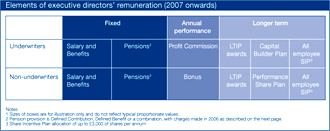Accountability
Directors’ remuneration report
- Amlin’s remuneration policies are designed to support its vision and strategic objectives, specifically:
- To secure the maximum possible alignment between the interests and long term career development of executive directors and other senior employees with the ambitions of the Amlin Group and its shareholders.
- To have first class employment practices, contributing to Amlin being “the place to work” for high quality people in its sector. This requires levels and structures of remuneration that are appropriate to attract, retain, incentivise and reward the high calibre talent that the Group and shareholders require.
- To reward management focus both on immediate financial measures, such as return on equity and underwriting returns, and on longer term objectives such as underwriting cycle management and the long term sustainability of the business.
Overview
The Remuneration Committee of independent non-executive directors is not only responsible for ensuring that the Group’s vision and strategy is supported by its remuneration policies and practices, but that its own role is carried out consistently with Amlin’s stated core values, which include:
- Integrity (independence, objectivity)
- Professional excellence (proper process and governance, on the basis of full information and professional advice)
- Leadership (being aware of market trends, but shaping Amlin’s policies to its own specific needs)
2007 was a year of implementation following a strategic remuneration review in 2005-06 and the adoption of a number of new incentive plans at the 2006 Annual General Meeting. In 2007 the first awards were made under the Long Term Incentive Plan 2006, which have replaced executive share option grants, and under the all-employee Share Incentive Plan 2006. These developments followed the introduction of a new Capital Builder Plan for underwriters and reform of pension and retirement arrangements, both in 2006.
The structure of the various elements of executive renumeration is summarised below.
Elements of Executive Directors remuneration (2007 onwards)

Click here for full sized image
The split of each executive director’s remuneration in 2007, including the annual performance reward category but not the longer term category, shows that a significant proportion of their remuneration was performance related. The extent of the performance related rewards relates to the recent successful financial and underwriting performance of the Group, reflecting, together with the structure of longer term rewards, the objective of aligning management and shareholders' interests.
Further details of each element of the above components of 2007 remuneration, and the basis of calculation of the performance related elements, are set out in later sections of this report.

Status of report
As required by the Directors' Remuneration Report Regulations 2002 (as amended), in accordance with which this report has been prepared, the sections entitled 'Remuneration received', 'Executive directors’ pensions', 'Executive directors’ Capital Builder Plan participations' and 'Executive directors’ Performance Share Plan Long Term Incentive Plan and share options participations' have been audited by Deloitte & Touche LLP. The remainder of this report is unaudited.
The Committee, its advisers and terms of reference
Details of the Committee’s membership and attendance are the set out here in the Board Corporate Governance statement and are hereby incorporated into this report. The Committee is assisted by the Group’s HR Director and by advice and recommendations from the Chief Executive. The Chairman of the Company is also invited to attend meetings for most agenda items. The Company Secretary acts as secretary to the Committee and advises it on governance and related matters.
In summary, the Committee’s terms of reference, which are published on the Company’s website and are available on request from the Secretary, are to determine the total individual remuneration packages of each executive director of the Company and of the Chairman, the Company Secretary and certain other senior employees (in each case including exit terms), and to recommend to the Board the framework and broad policies of the Group in relation to senior executive remuneration.
The Committee determines the targets for all of the Group’s performance-related remuneration and exercises the Board’s powers in relation to all the Company’s share and incentive plans. It acts in accordance with the Principles of Good Governance and Code of Best Practice and its terms of reference reflect the Combined Code on Corporate Governance.
 L – R: Ram Mylvaganam, Committee Chairman, with Committee Member Sir Mark Wrightson and HR Director Mark Farrow.
L – R: Ram Mylvaganam, Committee Chairman, with Committee Member Sir Mark Wrightson and HR Director Mark Farrow.
The Committee was advised during the year by New Bridge Street Consultants LLP (NBSC), which advises the Committee on the structuring and utilisation of the Group’s performance related incentives and on remuneration policy generally, including providing benchmarking data. NBSC also advises executive management from time to time on remuneration matters which may not be within the direct purview of the Committee and advises the Board as a whole on the remuneration of the nonexecutive directors. Occasional legal advice has also been provided to the Committee by Linklaters LLP and Dechert LLP. A statement regarding the Company’s relationship with the Committee’s advisers is published on the Company’s website and is available on request from the Secretary.
